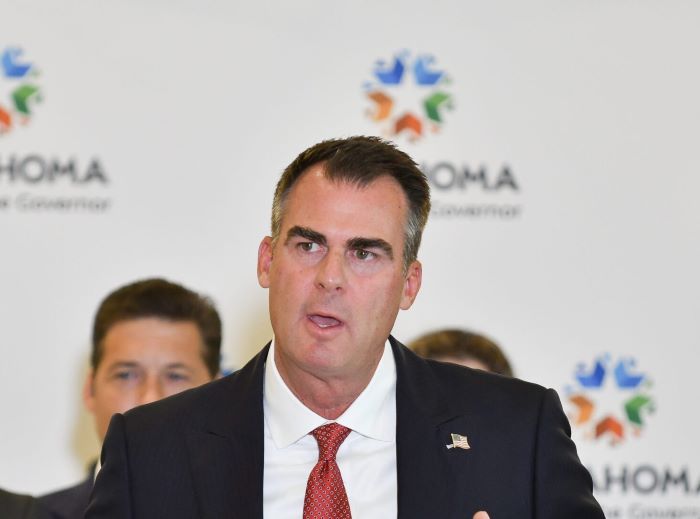Oklahoma Senator Pushes for Taxpayer-Funded Land Buys After Grand Lake Flooding-Outrageous or Necessary? U.S. Senator Markwayne Mullin is advocating for two policies: first, that the federal government should purchase flooded Oklahoman land along the major tributaries of Grand Lake; and second, that a plan to investigate the possibility of harmful sediment buildup should be abandoned.
Mullin accused the Federal Energy Regulatory Commission of reinterpreting “language from over 85 years of precedent and multiple Acts of Congress” in a letter he sent to the agency on May 7. In January, the Commission determined that the responsibility for purchasing landowners in Miami, Okla., from the Grand River Dam Authority—a non-appropriated state entity in charge of Grand Lake and Pensacola Dam—should be with the Commission. This decision has being appealed by the Grand River Dam Authority.
Mullin contended that the federal government ought to shoulder the financial burden rather than the Grand River Dam Authority, which may impose it on numerous Native American, rural, and low-income ratepayers.

“The public as a whole must bear the cost,” Mullin wrote.
In a letter to the federal regulator, the senator requests that it reverse its earlier decision.
Flooding has been a long-standing problem in Miami, a community of around 13,000 people located north of the confluence of the Neosho, Spring, and Elk rivers, which create Grand Lake. Flooding, according to city officials, is mostly due to the backwater effect that occurs during severe rain storms at Pensacola Dam.
Impounding what is now called Grand Lake, the Pensacola Dam in Langley was completed in 1940. The dam has been relicensured multiple times since then. Renewal of the Grand River Dam Authority’s license with the Federal Energy Regulatory Commission commenced in 2017. By May of 2025, officials aim to have issued a new license.
Read More:- Why Is the Oklahoma Association of Chiefs of Police Against the New Immigration Law? What Really Happened?
Following a successful appeal by the city of Miami, the Federal Energy Regulatory Commission determined in January that the Grand River Dam Authority was indeed not liable for the flooding.
The Grand River Dam Authority has been requested by the city, certain local American Indian tribes, environmental organizations, and individuals to conduct a harmful sediment study as part of the licencing process.
The Neosho River receives water from the heavily polluted Tar Creek, which originates in the former Tri-State Mining District. City officials and residents are concerned that the higher parts of the lake are becoming increasingly polluted as a result of the accumulation of harmful silt from Tar Creek. This is challenged by the Grand River Dam authorities..
According to Mullin, the Grand River Dam Authority should not be compelled to investigate the possibility that debris from Tar Creek is polluting other rivers by the federal regulator.
According to the Grand River Dam Authority, the United States government is not willing to do the hazardous sediment research. The task ought to be handled by the Environmental Protection Agency.
According to Mullin’s letter, the Grand River Dam Authority might have to pay for “expensive and burdensome remedial measures” if the investigation confirms what the reservoir owners already suspected, and the state-run utility shouldn’t have to pay for cleaning from previous mining activities.
According to readfrontier, In response to Mullin’s letter, Grand River Dam Authority CEO Dan Sullivan expressed his agreement. Once the lake reaches flood stage, the water discharges are supervised by the U.S. Army Corps of Engineers. Congress has previously requested that the Corps determine if additional lands are needed for flood management.
Sullivan said that the next logical question is why Congress would request that the Corps of Engineers investigate flood control when it clearly wasn’t their job to do so.
According to Sullivan, the impacted property owners would have to fork up almost $150 million to have their land purchased, which would lead to higher electricity bills. He went on to say that since Miami gets its electricity from the Grand River Dam Authority, pricing hikes will likewise affect Miamians.
“The citizens of Miami, who are also our ratepayers, are the only ones we could rely on,” Sullivan stated. The power bills of Miami residents are now going toward the cost of legal representation, and I don’t think many people fully grasp the financial complexities of this case. On the other hand, they would have to fork up cash to cover legal fees and their share of any damages awarded.
According to Miami Public Works spokesperson Melinda Stotts, the city and its tribe partners are actively involved in the relicensing of the Pensacola Dam in the hopes of finding solutions to the community’s floods.
“Given the devastating weather events that have hit our city and state recently, our resolve to discover lasting solutions has only grown stronger,” Stotts stated. We shall persistently champion the interests of our community in all that we do as we strive to restore and fortify our city following these tragedies. One aspect of this is dealing with the ways in which the Tar Creek Superfund site’s contamination interacts with the Pensacola Project.
In this post, we will explore “Oklahoma Senator Pushes for Taxpayer-Funded Land Buys After Grand Lake Flooding-Outrageous or Necessary?”

Natalie Clydesdale is a journalist at oklahomansdecide.org, where she covers crucial local and state news with a focus on accuracy and depth. Her extensive experience in investigative reporting ensures readers receive clear and reliable information. Follow her latest updates on Instagram.







